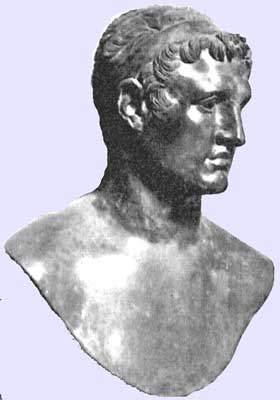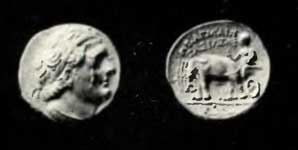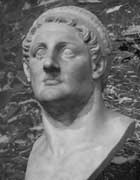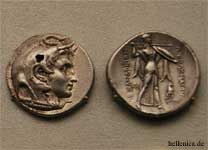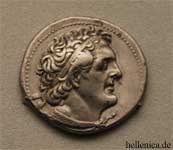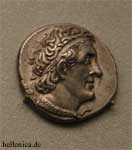Ptolemy I Soter (Πτολεμαίος Ι Σωτήρ) Ptolemaic King of Egypt with Berenice I and Ptolemy II Ptolemy I Soter (367 BC–283 BC) was the ruler of Egypt (323 BC - 283 BC) and founder of the Ptolemaic dynasty. In 305 BC he took title of King. The son of Lagus, a Greek nobleman of Eordaea, he was one of Alexander the Great's most trusted generals, and among the seven "body-guards" attached to his person. He played a principal part in the later campaigns of Alexander in Afghanistan and India. At the Susa marriage festival in 324, Alexander had him marry the Persian princess Artacama, but we find no further mention of her. When Alexander died in 323, Ptolemy is said to have instigated the resettlement of the empire made at Babylon. He was now appointed satrap of Egypt under the nominal kings Philip Arrhidaeus and the young Alexander IV.
Bust of Ptolemy I of Egypt, British Museum, London He at once took a high hand in the province by killing Cleomenes, the financial controller appointed by Alexander the Great; he also subjugated Cyrenaica. He contrived to get possession of Alexander's body, which was to be interred with great pomp by the imperial government in Macedonia, and placed it temporarily in Memphis. This act led to an open rupture between Ptolemy and the imperial regent Perdiccas. But Perdiccas was murdered in an attempt to invade Egypt of 321. In the long wars between the different Diadochi that followed, Ptolemy's first object was to hold Egypt securely, and secondly to secure control in Cyrenaica, Cyprus and Palestine (Coele-Syria). His first occupation of Palestine was in 318, and he established at the same time a protectorate over the petty kings of Cyprus. When Antigonus, master of Asia in 315, showed dangerous ambitions, Ptolemy joined the coalition against him, and, on the outbreak of war, evacuated Palestine. In Cyprus, he fought the partisans of Antigonus and re-conquered the island (313). A revolt of Cyrene was crushed in the same year.
Silver coin depicting Ptolemy I (r. 305 - 283), In 312, Ptolemy and Seleucus, the fugitive satrap of Babylonia, invaded Palestine and defeated Demetrius, the son of Antigonus, in the Battle of Gaza. Again he occupied Palestine, and again—a few months later, after Demetrius had won a battle over his general and Antigonus entered Syria in force—he evacuated it. In 311, a peace was concluded between the combatants, soon after which the surviving king Alexander was murdered in Macedonia, leaving the satrap of Egypt absolutely his own master. The peace did not last long, and in 309 Ptolemy commanded a fleet in person which detached the coast towns of Lycia and Caria from Antigonus, then crossed to Greece, where he took possession of Corinth, Sicyon and Megara (308 BC). In 306, a great fleet under Demetrius attacked Cyprus, and Ptolemy's brother Menelaus was defeated and captured in the decisive Battle of Salamis. The complete loss of Cyprus followed. Antigonus and Demetrius now assumed the title of king; Ptolemy, as well as Cassander, Lysimachus and Seleucus I Nicator, responded by doing the same. In the winter of 306 BC, Antigonus tried to follow up the victory at Cyprus by invading Egypt, but here Ptolemy was strong, and held the frontier successfully against him. Ptolemy led no further expedition against Antigonus overseas. To the Rhodians, besieged by Demetrius (305/304), he sent such help as won him divine honours in Rhodes and the surname of Soter ("saviour"). When the coalition was renewed against Antigonus in 302, Ptolemy joined it and invaded Palestine a third time, whilst Antigonus was engaged with Lysimachus in Asia Minor. On a report that Antigonus had won a decisive victory, for a third time he evacuated the country. But when news came that Antigonus had been defeated and slain by Lysimachus and Seleucus at the Battle of Ipsus in 301, he occupied Palestine for the fourth time. The other members of the coalition had assigned Palestine to Seleucus after what they regarded as Ptolemy's desertion, and for the next hundred years the question of its ownership became a recurrent point of enmity between the Seleucid and Ptolemaic dynasties. Henceforth, Ptolemy seems to have mingled as little as possible in the rivalry between Asia Minor and Greece; his possessions in Greece he did not retain, but Cyprus he re-conquered in 295/294. Cyrene, after a series of rebellions, was finally subjugated about 300 and placed under his stepson Magas. In 285 he abdicated in favour of one of his younger sons by Berenice, Ptolemy II, who had been co-regent for three years; his eldest (legitimate) son, Ptolemy Ceraunus, whose mother, Eurydice, the daughter of Antipater, had been repudiated, fled to the court of Lysimachus. Ptolemy I Soter died in 283 at the age of 84. Shrewd and cautious, he had a compact and well-ordered realm to show at the end of fifty years of war. His name for bonhomie and liberality attached the floating soldier-class of Macedonians and Greeks to his service; nor did he neglect conciliation of the natives. He was a ready patron of letters, founding the Great Library of Alexandria. He wrote himself a history of Alexander's campaigns, distinguished by its straightforward honesty and sobriety—except where his own actions were concerned, when he tended to inflate his own importance to events. Although lost, it was a principle source for the surviving account by Arrian of Nicomedia.
Head of Ptolemy I, diadem, wearing aegis.
Ptolemy I Soter, British Museum: Photo PHGCOM
Links
Retrieved from "http://en.wikipedia.org"
 |
|
||||||||||||||||

